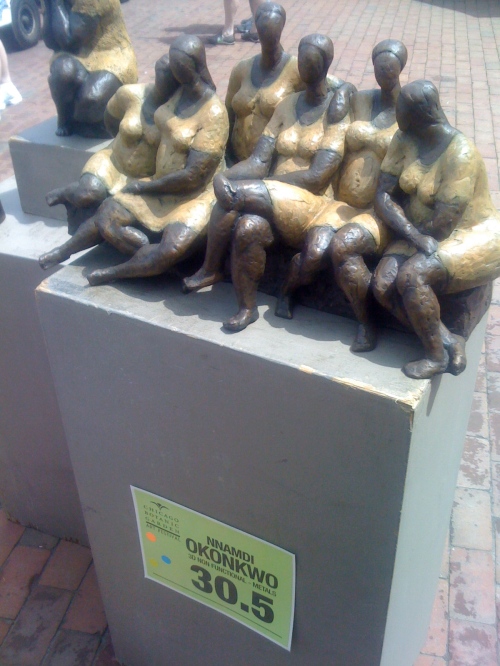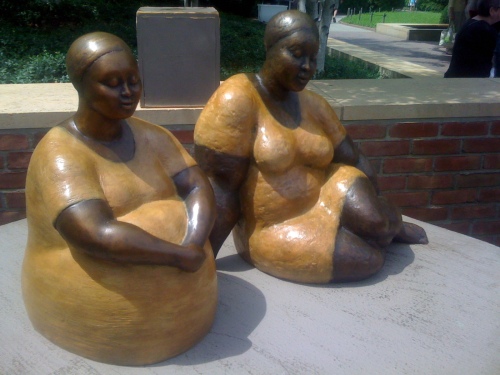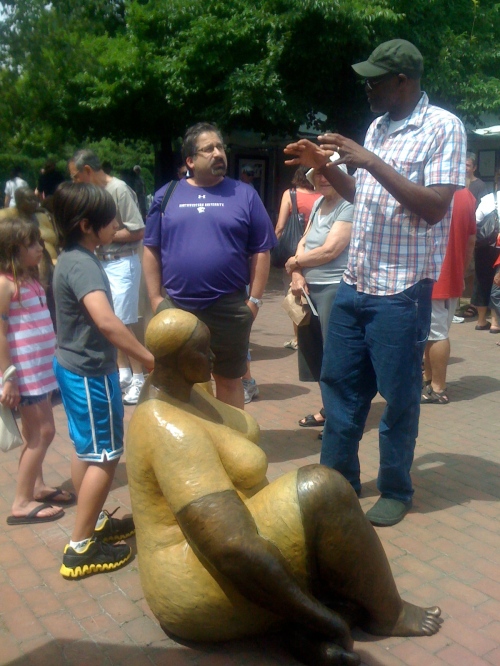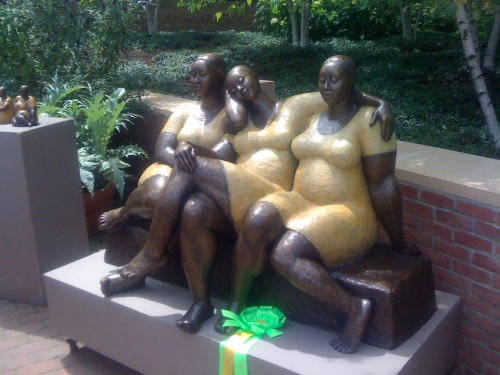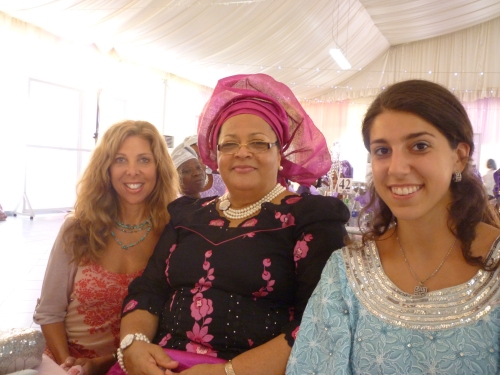My Naija friend showed me this video. It is quite absurd, talking all about how Ghanaians are so happy they are not Nigerians. The song is by two guys who call themselves the FOKN Boys. They can’t even get their grammar correct.
The story behind the song goes back to soccer. A match between Ghana and Nigeria was scheduled to hold in London this week. The FOKN Boys released this song to spark the rivalry. The match was cancelled because of the riots plaguing London right now. I am trying to come up with a reaction song, “Thanks God I’m not a Ghanaians.” Any ideas? There will be a diplomatic brohaha about this matta.
Archive for the ‘Blogstream’ Category
The start of a diplomatic breakdown
Posted in Blogstream on August 12, 2011| 16 Comments »
Lagos duality
Posted in Blogstream on July 26, 2011| 12 Comments »
These two videos about Lagos-the largest city in Africa behind Cairo-tell two very different stories. They are both completely true and paint Nigeria as having polar opposites. One night at a restaurant in Lagos I sat down and introduced myself to a table of three white women. I was so curious to see who they were and what their business was in the mega city. We were on Victoria Island at the time. When I mentioned how I had gone to visit a friend in Yaba the other day and was staying in Surulere, the women couldn’t believe it. “We aren’t allowed to leave the island,” one of them said, adding how her driver said the mainland was unsafe. If I can ride an okada in Ojota, I’m pretty sure this woman’s driver can take her across the Third Mainland Bridge.
These videos show two distinct yet inseparable ways of life in Lagos. It’s hard to see such extreme poverty next to lavishness. As Lagos keeps growing by the millions, where will people go? I think the city of Lagos itself needs its own “population commission” to answer these questions and plan sustainable solutions. I hope to be part of the planning to see Lagos grow in a smart way.
Nigerians in random places
Posted in Blogstream, tagged Nigerian art, Nnamdi Okonkwo on July 8, 2011| 11 Comments »

Nigerian artist, Nnamdi Okonkwo and I in front of his award winning sculpture at the Chicago Botanic Gardens art show.
It was a Sunday morning. The alarming chime of the telephone rudely woke me up. It was my step-dad telling me to get out of bed and come to the Botanic Gardens near my house. “I am with a Nigerian guy and he has seen your videos! He wants to meet you,” he told me excitedly. Of course I scurried out of the house, hopped on my bike to see the anonymous Nigerian who had befriended my parents. I made my way through the crowds of suburbanites enjoying a beautiful Sunday until I spotted them. With his staggering height and black skin he stood out pretty well in the homogenous crowd. He introduced himself as Nnamdi Okonkwo (like the famous character in Things Fall Apart) and told me he was so excited to meet me after reading an article about us in The Punch and reading my blog. He is Igbo and came to the U.S. in 1989. The Chicago Botanic Gardens in Glencoe is the last place I would think to run into a Nigerian artist. This encounter just proves that there are no limits to the places a Nigerian might go. Such a genuine and talented artist, my parents loved his sculptures of plump women so much they bought one.
Glimpses of Nigeria in Pictures
Posted in Blogstream, University of Ibadan on May 18, 2011| 17 Comments »

I experienced this sky on entering Ibadan on the way back from Lagos. I love clouds and this made me think of the heavens opening up. I love it.

What the Student Union Building on the University Campus looks like when there is no electricity. All of these are little generators that power the many copy machines and computers running at different stalls. Copying books and hiring people to type essays for you is a big business on campus.

UI students who do not live in dorms, or hostels live in places called Boys Quarters. This is a block of Boys Quarters where some of my friends live. I hang out here often.

A danfo, what we call mini buses that act as taxis, that is ridiculously full of some strange objects that I cannot identify. With the way danfos are packed to the brim with bags of rice, beans, pieces of cow until the back of the car is almost touching the ground, it's a wonder they can actually move.

Welcome to the butcher. Men carry wooden boards on their head and hawk huge slabs of meat around the market. The meat sits out in the sun and is not covered from flies or any other thing. If you want to buy, he takes it off his head and cuts you a piece, as seen in this picture.

Birds stick to their lane on the University of Ibadan track. Apparently these birds come everyday to the track around twilight.
Ibadan Snapshots
Posted in Blogstream, tagged Ibadan, Nigeria on April 29, 2011| 12 Comments »

A freshly tarred road leading down from the hill that takes you to Bowers Tower, the highest point in Ibadan.

Bodija, next to the train tracks in Ibadan. Women stand on the side of the road, near the quarry, maybe waiting for public transportation.
We eat butter
Posted in Blogstream, Food, Travel Notes on April 25, 2011| 23 Comments »
There are two types of people in Nigeria , those that eat butter and those that eat cassava. In modern day Yoruba, we call the former grope the ajebota and the latter, less fortunate group the ajepaki. The literal translation of these two word is “we eat butter,” and “we eat cassava.”
An ajebota (pronounced ah-jay-butta) is someone who lives a privileged, pampered life. In Nigeria, a spoiled life means having a driver to endure the hours of traffic and bad roads while you sit on the phone chatting on your BB. It means hardly minding the electricity outages because of the trusty generator that kicks in whenever NEPA happens. The term ajebota carries a negative meaning sometimes, that the person is not just spoiled, but insensitive and out of touch to realities of the world. I think the title ajebota for this type of lifestyle arose out of the fact that butter is rare in Nigeria. Most families eat one of the many unhealthy varieties of margarine. So those who eat butter and have the means to refrigerate it continuously are among the elite.
An ajepaki (pronounced ah-jay-pah-kee) is someone who lives a life with hardships and struggle. It means walking with your bucket to fetch water to take your bath every morning, spending long hours in the dark whenever the light goes. Calling someone an ajepaki is saying that person must work hard for the little he has. Paki means cassava in Yoruba. To those foreign to the plant, cassava is a tuber (in the potato family) that grows abundantly in Nigeria. Nigerians grind it up, add cold water and drink it as a snack called garri or add hot water, turn it and eat it as a meal called eba. It has a sour taste that took me a long time to get used to. Cassava is extremely cheap to buy so those who don’t have much must get by with garri and eba.
These terms are not official. They don’t have a deep meaning in the Yoruba culture and I have never heard anyone call himself an ajebota or ajepaki. They are modern day slangs that friends to make fun, tease or describe one another.
That being said, my mom from America arrived in Lagos last week. She is here for three weeks to visit me and walk in my shoes. We are having an incredible time together, and I apologize for not posting more but I have been a bit distracted. We were in Lagos for a few days and had quite an ajebota experience. From VIP tickets to Fela on Broadway, Chapmans at the News Cafe in Lekki, to air conditioned cars, my mom and I had a great time in Lagos. She is most amazed by the way cars share the roads with hawkers, wheelbarrows, and bikes weaving in and out. Even as we are back in Ibadan now her senses are on overload, taking Nigeria in. I could not be more excited that my real mom is visiting me in my new home.
Yorùbá Music: ‘Bimpé’ by Asa
Posted in Blogstream, Speaking Yoruba, tagged Asa, Bimpe, Yoruba music on April 15, 2011| 11 Comments »
I love this song. It’s by Asa (pronounced Asha), a popular Nigerian artist who lives in France now. I love the beat and decided to translate it to Yoruba for non-Yoruba speaker listeners who like it also. Enjoy!
Bimpé n ba mi wi Bimpe is mocking me
O f’owó sinu business mi She’s meddling in my business
Èmí re kò lè gbe She can’t handle me
O kan saájú mi bímo ni She just had a baby first
Mo gbó pé o mo mi loju I heard you glared at me
O n nla gboa nipa business ni You’re gossiping about my business
Òrò èmí rè kò le ni You can’t take me
Ègbón rè fé mi ni It’s your older brother who wants me
Ègbón rè tó n fé mi lowo ni o Your older brother is the one who loves me
Mo tí ya fún I’ve chosen
Ègbón rè, ègbón rè haa Your brother
E ba mi so fun baby yen Tell this babe for me
Fún baby yen For that babe
Tó n wole yen Who is coming in
E ba mi kílò fún Warn her for me
E kílò fún ya Warn her
E ba mi so fún sisi yen Tell this chick for me
Fún sisi yen For this chick
Tó kun atike Who wears talcum powder
E ba mi kílò fún Warn her for me
E kílò fún ya Warn her
Bimpé rí mi fín Bimpe disrespects me
O n huwá omo laisimoyé She’s behaving like a child without wisdom
Mo ronú pìwàdà I’m thinking deep about this
Omo inu mi lo n ba mi wi That a younger person is talking to me this way
Ilé ana mo re l’Oyó
Wa kúkú yen si mi
Irè ò l’aponle You don’t have appreciation
O de fé ki ènìyàn fe e silé And you hope someone will marry you
Ègbón rè tó n fé mi lowo ni o Your older brother is the one who loves me
Mo tí ya fún I’ve chosen
Ègbón rè, ègbón rè haa Your brother
E ba mi so fun baby yen Tell this babe for me
Fún baby yen For that babe
Tó n wole yen Who is coming in
E ba mi kílò fún Warn her for me
E kílò fún ya Warn her
E ba mi so fún sisi yen Tell this chick for me
Fún sisi yen For this chick
Tó kun atike Who wears talcum powder
E ba mi kílò fún Warn her for me
E kílò fún ya Warn her
Ègbón rè tó n fé mi lowo ni o Your older brother is the one who loves me
Mo tí ya fún I’ve chosen
Ègbón rè, ègbón rè haa Your brother
E ba mi so fun baby yen Tell that babe
Fun baby yen to n wole ye That babe who is coming in
E ba mi kílò fun Warn her
E kílò fun yeah Warn her
E ba mi so fun baby yen tó gbomo pon, tó ku atike Tell the girl who backs a baby and wears makeup
E ba mi kílò fun, e sòrò fun yeah Warn her, tell her
E ba mi so fun baby yen Tell the babe
Kó fo sòké, kó fi mi le She might as well just jump up and down, and leave me alone
Ti kò ba wo, kó la rí mo lé She can smash her head against the floor [go to hell]
E ba mi kílò fún Warn her
E kílò fún yea Warn her
E ba mi so fún baby yen Tell the babe
Kó fo sòké, kó fi mi le She might as well just jump up and down, and leave me alone
Kó rin lòfá She should walk away
E ba mi kílò fun Warn her
E sòrò fun yea Tell her
Deep thoughts: Hybrid Nigeria and rediscovering roots
Posted in Blogstream on March 28, 2011| 19 Comments »
Planting inspiration in the hearts of Nigerians to revive their native languages was not my goal when I sat at the registration table as a wide eyed, naiive freshman (fresher) with the first semester Yoruba language class schedule in front of me. Honestly, taking Yoruba for six college semesters with one summer of 5+ hours of class per day, all with the same group of 6 students was challenging. It was dulling at moments, wonderful at others. I persevered because my heart was in it. Nothing felt better than conveying a complex thought, like the dangers of nuclear weapon proliferation, in Yoruba. I am an adventurer, curious by nature and not afraid to take risks. Taking Yoruba was a risk but I knew that if I committed to it, I would see it through to the end. I consider currently living in Nigeria for 10 months the middle.
A film I just had the chance of viewing is bringing all of these thoughts to life. It was a fluke I actually made time to see it. A random guy at the Faculty of Arts invited me to the showing, saying he would really appreciate my input. “I will try to be there,” I said half-heartedly. I felt his pleas sincere so around 11:15 a.m. I moseyed through the wet, late morning heat to the Post-Graduate room in the Communications Language Arts department. Le Maletendu Colonial directed by Jean-Marie Terio is a documentary about mainly the German colonization of Namibia through the lens of Christian evangelism. It highlights the 1904 German genocide of the Herero people (something I had never even heard of before this film.) It talks about africa as a whole and how the colonial rulers destroyed the foundations of African culture in place of more “civilized” European methods. It left the impression that Africans need to do something to rediscover and develop their African-ness. I don’t think it took an Oyinbo from America speaking Yoruba to plant the idea in people’s heads that promoting Nigerians’ own roots and maintaining culture is important, but I am definitely a scare tactic.
Professors and teachers talk a lot about how Nigerian youths are not paying enough attention to their own cultures. Even your blog comments point to Nigerians’ widespread disregard towards speaking mother tongues. People say something needs to change, but what exactly and how? Is a blend of cultures bad? Descend the plane at Murtala Mohammed airport in Lagos and you will immediately see that Nigeria is a hybrid society, a combination (amulumola) of Euro-American with African. This is not a bad thing. After all, we do live in a completely connected, globalized world. People wear jeans, suits and ties in every country on this earth. This is all well and good as long as Nigerians don’t forget about their own cultures.
I am worried though. Iro and buba, hair weaving and amala are dissolving and being replaced by jeggings, wigs and french fries. Students in UI only wear “native” clothing, the beautiful, bright outfits made out of ankara fabrics, on Fridays.
If a Nigerian revival is necessary, what does it need to look like? What is lost that has to be found?
In the discussion after the film, a Nigerian girl said, “I agree with the fact that we need to do something to support our own cultures, but what should I do? I need specifics.” I don’t think the key to awakening Nigerian cultures lies in ephemeral, materialistic things, politics, religion or economics. You cannot just denounce Christianity, start worshiping all the Yoruba deities and call it a day, o pari! I think the change needs to be individual, personal and deep. It should be a deep conviction of the heart to be proud, passionate and persuasive about Africa’s goodness. In other words, I think Nigerians need to remind themselves about the Yoruba concept of “Omoluabi”. An omoluabi is a child of good breeding, peaceful disposition, good behavior, educated in traditions and an overall good person. An omoluabi definitely knows his native language and can converse well. He has utmost respect for elders–like his culture dictates–is not selfish, knows stories about the Ijapa (turtle) and helps out with housework. It is a compliment for any child to receive this title, a complex, deep definition of a good African child. It will make the parents especially proud, a testament to their parenting. Respecting and striving for Omoluabi is a honorable goal and I think it can be a specific thing Nigerian youth look to when they think about reviving their culture. It is okay for an omoluabi to wear jeans and Ed-Hardy t-shirts, as long as the Nigerian personality is still there under the Euro-American veneer…
I have unintentionally propelled myself into the international Nigerian stage as a a catalyst of a Nigerian culture renaissance. I am happy to be here and hope I can help make real changes, whatever those changes might be.
What do you all think about the concept of Nigerians losing their cultures? Do you think it’s true? if it is, is it a problem? What can people do to retake their cultural roots?
